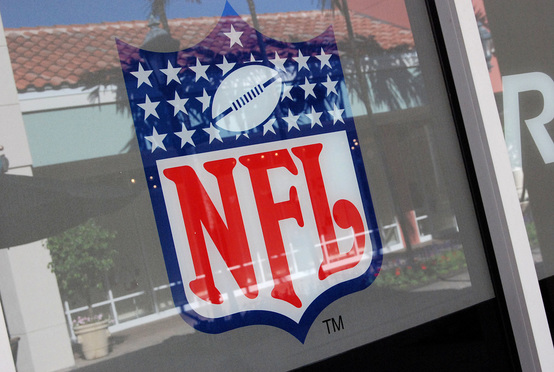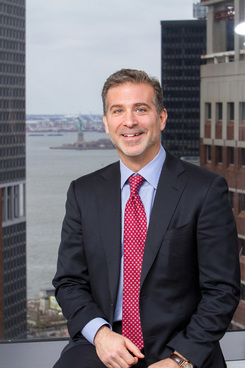 Photo: Flickr user hyku via Wikimedia Commons.
Photo: Flickr user hyku via Wikimedia Commons.
A lead attorney in the NFL concussion settlement has been very critical of numerous third-party litigation funding companies that have loaned money to retired players involved in the class action, but it is his alleged failure to publicly disclose his history with another litigation funding company that has raised some eyebrows recently.
Seeger Weiss attorney Christopher Seeger is lead class counsel in the high-profile NFL concussion litigation, and until recently he was a director of Esquire Bank and its holding company, Esquire Financial Holdings. According to a U.S. Securities and Exchange Commission filing, Esquire Financial Holdings has provided consumer loans to claimants involved in mass tort and class action settlements, including the NFL concussion settlement.
 Christopher Seeger.
Christopher Seeger.
Seeger has recently aimed criticism at several third-party litigation funding companies, which he said have entered into “predatory” loan agreements with former players and may even be engaged in falsifying documents, or coaching claimants to gain more favorable assessments in the claims process. He has also sought to have the settlement claims administrator withhold portions of awards owed to some of those third-party funders.
One of the third-party litigation funding companies Seeger has been critical of is Atlas Legal Funding. At a hearing about third-party litigation funders in September, Seeger Weiss partner TerriAnne Benedetto said the company was misrepresenting loan rates to former players, and highlighted one alleged loan from the company that had an interest rate of 33 percent.
However, in mid-November, Atlas filed a motion raising questions about Seeger’s past relationship with Esquire Bank. In a footnote in that motion, which was aimed at opposing efforts to have the claims administrator withhold money that could be subject to some loans, Atlas said the court could look into the topic, “as class counsel’s fiduciary duty is to the class as a whole and it includes reporting potential conflict issues.”
In an emailed statement, Seeger said he has brought any evidence of third-party lenders “preying on retired NFL players” to the court’s attention.
“We are aware that Esquire Bank has extended commercially reasonable loans with low interest rates and no closing fees. Any new evidence to the contrary will immediately be brought to Judge [Anita] Brody,” he said. “We appreciate the court’s swift action on this issue, and will continue to present our findings and ask for any necessary relief to ensure class members receive these important and hard-earned benefits.”
Esquire Bank was founded in 2006, with the focus of providing funding to attorneys. Seeger had been a director of the bank until May 2016.
A filing with the SEC from June stated that Esquire Bank has provided millions in post-settlement consumer loans and structured settlement loans, and that the company expects the post-settlement consumer loans to claimants to increase “based upon recent mass tort settlements including, but not limited to, the World Trade Center Victims Compensation Fund (VCF), the NFL Concussion case (NFL) and transvaginal mesh litigation matters (TVM).”
The company described the post-settlement loans as “bridge loans to individuals secured by proceeds from settled cases” that are generally used to meet the “life needs” of claimants. According to the filing, the company had provided $3.7 million to individuals in post-settlement consumer loans as of March 31.
Several current directors for the bank are lawyers, some of whom have worked with Seeger in the past, including Russ Herman of Herman Herman & Katz, who was part of a negotiating committee with Seeger regarding the Vioxx litigation, and Marc Grossman of The Sanders Law Firm, who had been appointed to serve on the plaintiff’s steering committee with Seeger in the Pinnacle hip implant multidistrict litigation.
Grossman and Herman each did not return a call seeking comment. Andrew Sagliocca, president and CEO of Esquire Bank, also did not return a call for comment. Marissa Parker of Stradley Ronon Stevens & Young, who is representing Atlas Legal Funding, also did not return a call seeking comment.
Victoria Sahani, a professor at Arizona State University’s Sandra Day O’Connor College of Law who focuses on civil procedure and ethics and has recently published a book about third-party litigation funding, said there are few rules dealing with third-party litigation funding.
In the U.S. District Court for the Northern District of California there is a court rule mandating parties involved in class actions to disclose any agreements with third-party funders, but that is the only court rule in the country specifically on the topic. The federal rules Advisory Committee has recently begun reviewing the issue in the context of multidistrict litigation, and there are some recommendations by the American Bar Association’s Ethics 20/20 commission regarding how attorneys should handle their professional ethics obligations when dealing with a third-party funder. Ethics rules already require that judges and attorneys serving as arbitrators must recuse themselves if they are involved with a third-party litigation funder involved in a case they are handling, but there are no ethics rules specifically addressing instances where attorneys serving as legal counsel to a party may be involved with litigation financing companies.
Sahani said ethical considerations must always be weighed in context and therefore could not speak specifically to the issue with Seeger and the NFL concussion settlement. But she said as a general principle the main inquiry is whether a conflict of interest exists. For example, if the loan deals were reached after the attorney left the bank, that may not have created a conflict of interest per se, but the attorney should likely disclose any relationship if there are suggestions the attorney could be using his position in the litigation to block other third-party funders from obtaining clients.
Whether any pitfall has been encountered depends on the factual setting, she stressed.
“That would depend on whether he’s making that comment in the context of actual litigation. If he’s on his Twitter account, that’s one thing. That might be his own way of advertising,” she said. “But if the comment is in the context of the actual litigation, if he’s making these statements on the record in court, that might be viewed as a self-dealing conflict of interest that is not allowed under the attorney ethics rules.”
North Palm Beach, Florida, attorney Patrick Tighe, who is representing 85 former players, said that, given Seeger’s efforts to block other litigation funding companies, his history with the bank “looks bad.”
“It may not be bad,” he said. “But it’s certainly interesting that he’s going after all these funders.”
Tighe and Seeger have previously clashed over the claims administration process, which Tighe has said has been moving too slowly. Tighe said the issue involving Esquire Bank did not seem like something attorneys representing former players would be raising in court filings, but rather it would more likely become a point of contention between the litigation funding companies.
“It’s not our fight,” he said, adding that his focus is “to have [the settlement] administered the way it’s written.”


